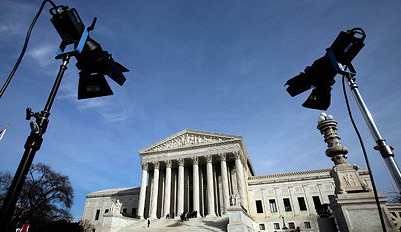Back when the Supreme Court ruled on NFIB vs. Sebelius—the original Obamacare case—there were two basic parts to the opinion: The individual mandate was upheld and the Medicaid expansion rules were struck down. Most liberals thought the reasoning behind the Medicaid decision was absurd, but I didn’t. I found it quite plain and persuasive. Basically, Congress had told the states that if they didn’t accept the Medicaid expansion, they’d lose all Medicaid funding. But states are supposed to have a legitimate choice about whether to accept new government programs, and this clearly didn’t give them any real choice. No state can afford to lose all its existing Medicaid funding. Congress had set things up so that technically each state had a choice, but it was really no choice at all. In practical terms, every state had to accept the expansion, and this was constitutionally unacceptable.
Two liberal justices agreed with this reasoning, as did the five conservative justices, including Anthony Kennedy. Over at the New Republic, Simon Lazarus notes that during oral arguments in the latest Obamacare case, Kennedy suggested a similar dynamic was at work. The plaintiffs were arguing that the text of the law clearly stated that federal subsidies were  available only to states that set up their own insurance exchanges. The problem here is that without subsidies Obamacare is not only useless, but could severely damage the existing insurance market in a state:
available only to states that set up their own insurance exchanges. The problem here is that without subsidies Obamacare is not only useless, but could severely damage the existing insurance market in a state:
Such a threat, he observed, could amount to unconstitutional “coercion” to pressure states to set up exchanges. If this is Justice Kennedy’s take, his most likely outcome would be to adopt an alternative interpretation that avoids having to face the constitutional issue. The Obama administration’s interpretation—that the ACA prescribes credits for customers on all exchanges, whether state-run or federally facilitated—fits that bill.
….Previously, only one case had invalidated a law under a coercion theory like the one Kennedy advanced—NFIB v. Sebelius itself. Then, the Court held unconstitutional the ACA’s method to incentivize states to expand Medicaid coverage to all adults up to 138 percent of the Federal poverty level. If they declined, states risked losing federal financial support for their pre-existing Medicaid programs, on average over 10 percent of state budgets. That, seven justices agreed in two separate opinions, was a bridge too far. Chief Justice Roberts, joined by progressive Justices Breyer and Kagan, ruled that this “financial inducement” amounted in effect to “a gun to the head . . . so coercive as to pass the point at which pressure turns into compulsion.”
Why were both sides caught off-guard by Kennedy’s attraction to extending the NFIB coercion holding to King, but this time for the benefit of the ACA? The reason, I suggest, is a deep bipartisan cynicism about the Court’s “federalism” jurisprudence….What that cynicism seems to have missed is that, as an ideological matter, Justice Kennedy takes very seriously what he repeatedly lauds as the “federal balance.”….In sum, Justice Kennedy might well see King v. Burwell more as an opportunity to advance his federalism ideology, than as a second shot at vindicating the Republican political priority of crippling Obamacare, for which he showed evident sympathy three years ago.
Interesting. Both Kennedy and Roberts could see this case as a way of gaining bipartisan support for a ruling that saves Obamacare but further entrenches the view of federalism stated in NFIB. They might both consider that worth it. While we all twiddle our thumbs waiting for the decision in King v. Burwell to be handed down, it’s an interesting possibility to ponder.


















